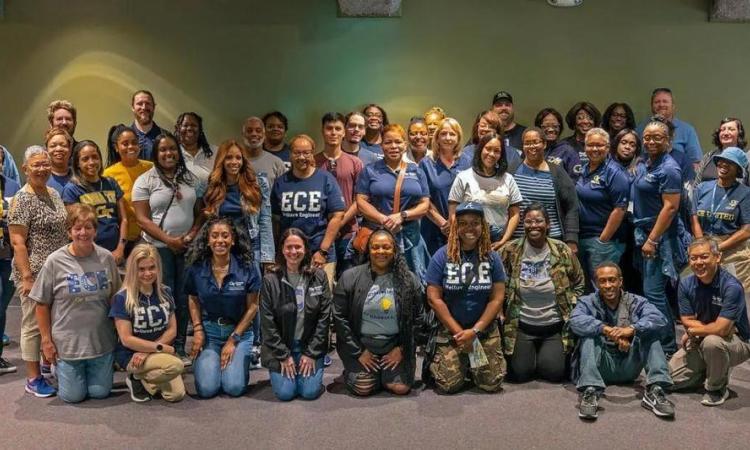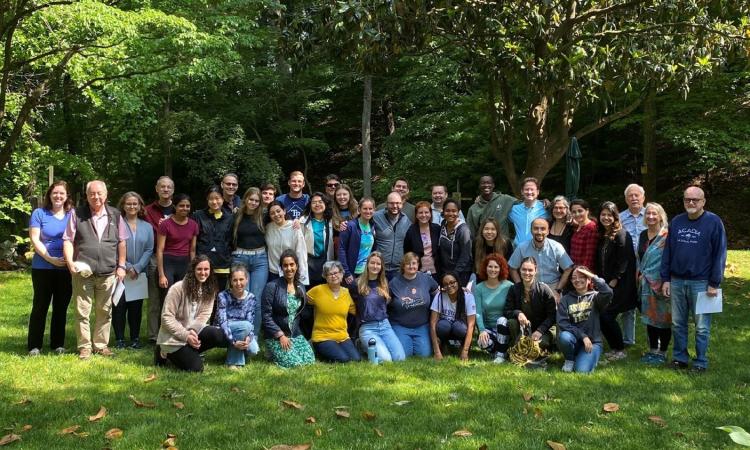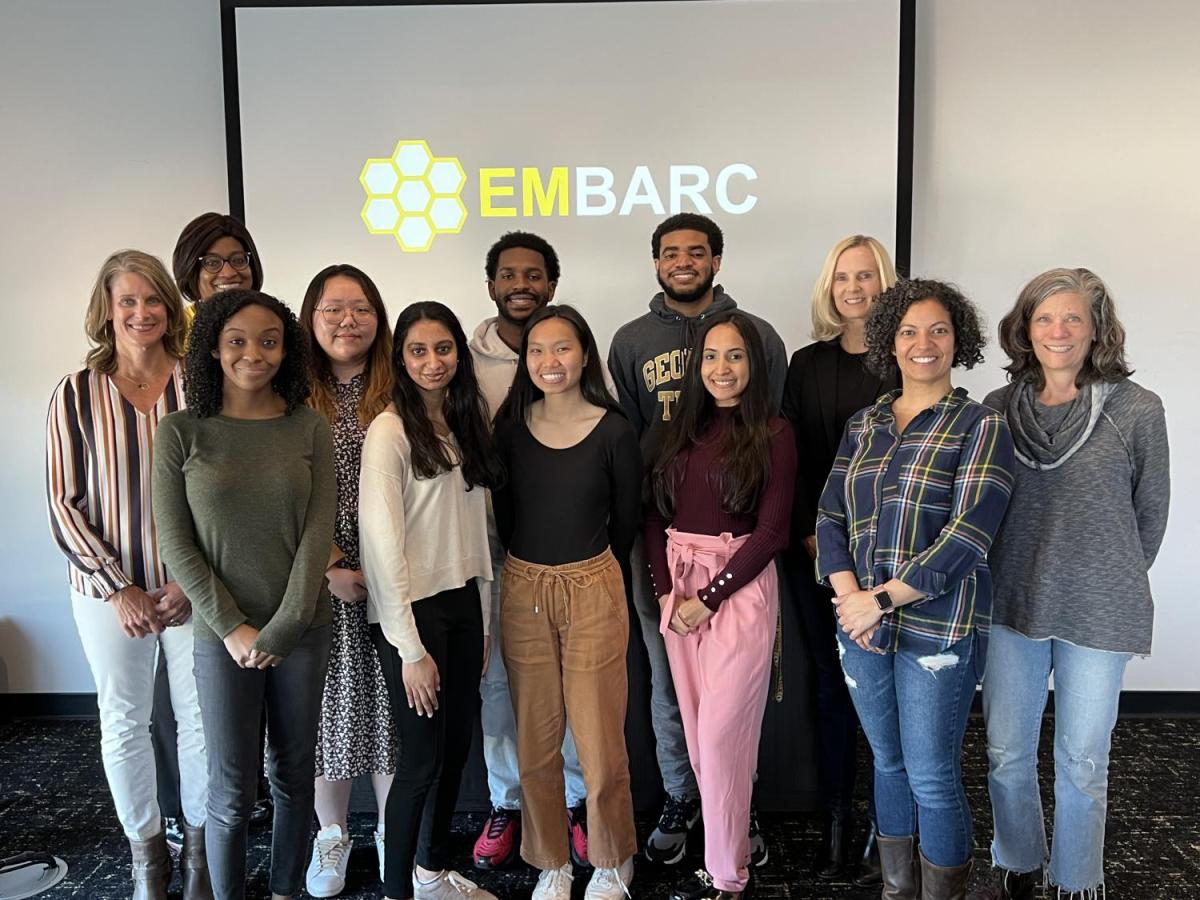
The first EMBARC cohort in 2021-2022.
When Beaudly Leriche first arrived at Georgia Tech's School of Electrical and Computer Engineering (ECE), presenting in front of others made him very nervous.
“I’m pretty introverted,” Leriche said, who graduated with a computer engineering degree in 2023. “I would be sweating, shaking, all those things.”
Fortunately, after just a couple years (and lots of practice) he learned to nail presentations, including his senior design project.
“As an engineer, you know all the math, you know all the physics, you know everything,” Leriche said “But it’s the soft skills that are lacking at times and can hold us back.”
That’s where EMBARC, co-led by ECE advisory board member Mel Coker (EE 1987), is making a difference.
Leriche contributes his improvement, in large part, to the program.
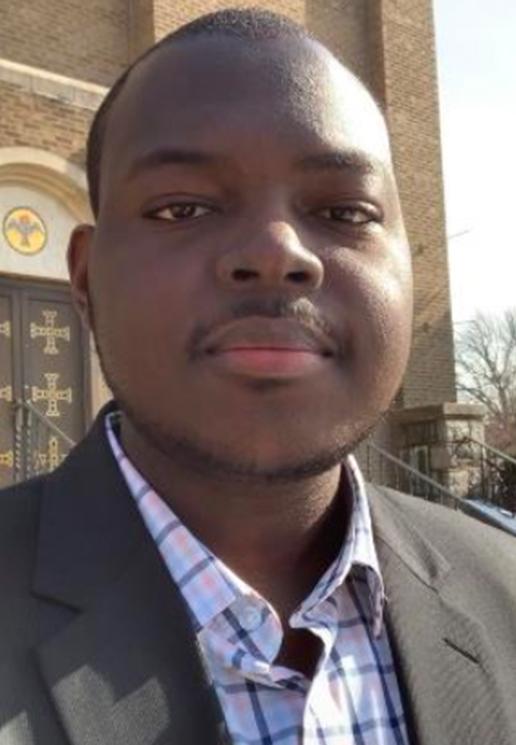
Beaudly Leriche, a 2023 Computer Engineering graduate, was part of the second EMBARC cohort.
Coker got her undergraduate degree in electrical engineering before going on to get an MBA at Georgia State and shifting her career to the business side of engineering. Her wholistic background – including over 20 years in senior leadership positions at AT&T and BellSouth -- made her uniquely qualified to train the next generation of engineers on crucial non-technical skills.
“I was very fortunate in my career to have lots of leadership training and soft skills training, so it was really a passion of mine,” Coker said.
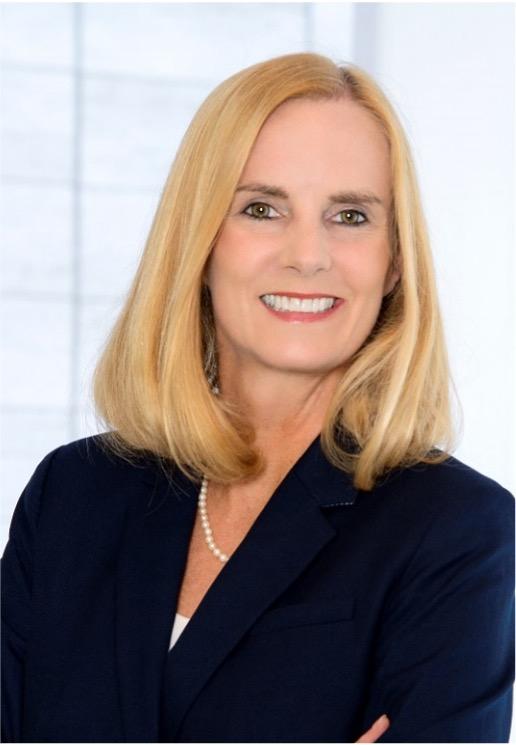
Mel Coker, an electrical engineering graduate, co-founded the EMBARC program with Sharon Spears.
Coker developed the curriculum with the help of her friend Sharon Spears, who also built a successful career at AT&T and BellSouth. They worked with School leadership and development to start the EMBARC program in 2021. Operated completely through the volunteer efforts of Mel and many others, the program equips students with the skills to be successful and stand out as leaders once they get into the workforce.
Coker and Spears lead the program with the help of Kristin Carney, a Georgia Tech College of Engineering (CoE) graduate who has held various leadership positions at Delta. ECE academic program manager Raquel Plaskett also plays a key role in facilitating the program.
“The EMBARC program has been a great asset to our students, and we thank Mel and the team for their hard work,” Steve W. Chaddick School Chair Arijit Raychowdhury said. “The valuable skills learned throughout the program help set our students apart in a competitive workforce.”
The hands-on 15-month EMBARC program is open to all CoE students and selects a small cohort of junior students via an application process, providing them with soft skills training and experiential learning opportunities.
It starts with improving communication skills. This includes learning how to tell one’s story, public speaking, and interpersonal communication.
“Mel and the program helped me to develop confidence to know I can explain what I’m doing, and it made me feel better about actually doing it,” said Leriche, who was part of the second cohort in 2022. “The communication side was very, very helpful."
The program works on 16 additional core skills such as leadership and teamwork, but also covers the intangible, unspoken rules of business that fly under the radar for many college students. This includes things like email subject lines, dinner etiquette, and dress codes.
“It’s all those small details that may not make you a better engineer, but make you a better colleague and human,” Leriche said. “Those skills give you a leg up in the workplace.”
Some of it may seem unconventional at first.
One activity has students build towers out of marshmallows and spaghetti as a way of learning how different work styles mesh together.
They also take a tour of an apiary, examining how the bee hives work together and providing students with a lesson on teamwork.
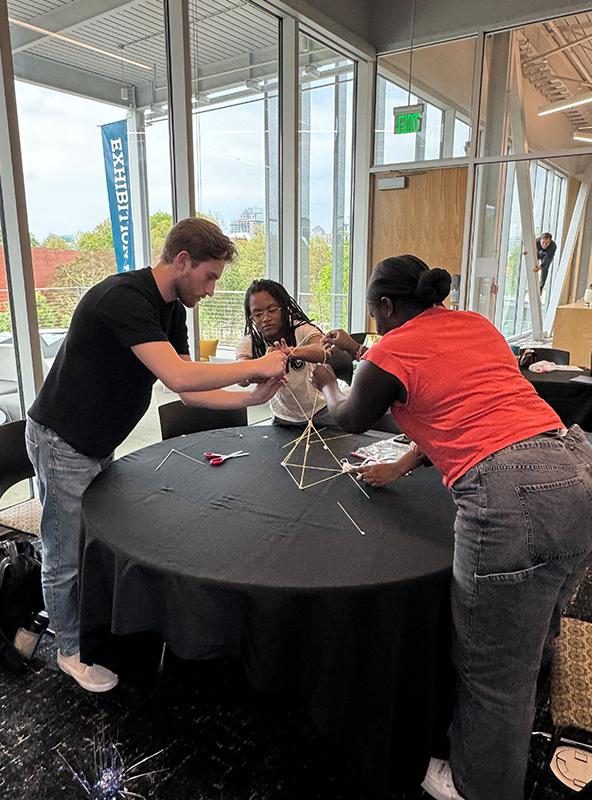
Students work in teams to build a tower out of marshmallows and spaghetti, teaching them how different work styles can mesh together and achieve success.
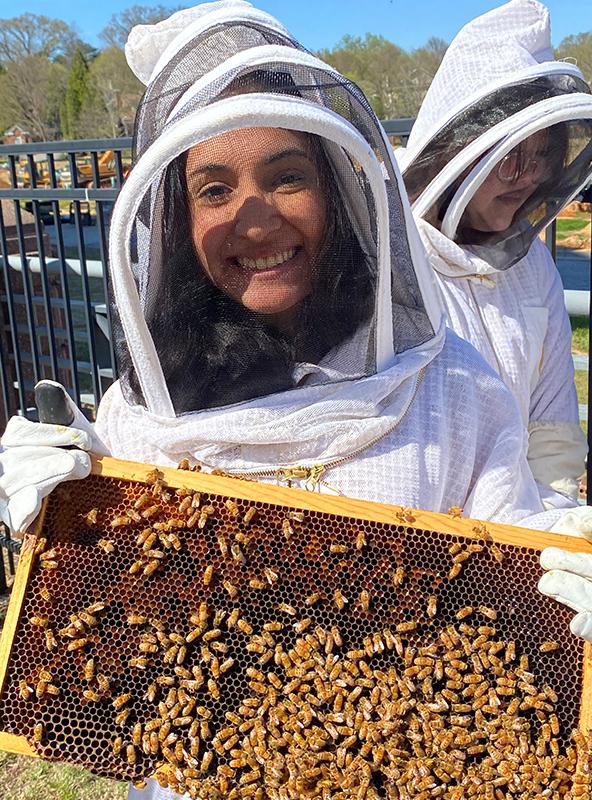
Students visit an apiary and examine beehives. The beehives are used to illustrate lessons in teamwork.
At every meeting, each student gets a random question about a current event and is expected to give a substantive answer for a minute in front of the group. They call it “extemporaneous speaking” and it's designed to help students to communicate more effectively, even in uncomfortable situations.
“Students generally hate it when it starts,” Coker said.
“We're put on the spot at meetings and it’s like, ‘All right, be bold, be courageous,’” said ECE graduate Leah Pincus, who was part of the first cohort in 2021 and now works at Southern Company. “It was something that I became really good at by the end.”
Establishing confidence is the ultimate goal of these activities.
“A lot of times you don't dream big enough if you come from an underrepresented group, you just want to be accepted first,” Pincus said.
Pincus was a “returning student” as she calls herself, who took a 15-year break between starting at Georgia Tech and coming back to finish her degree in electrical engineering.
Leriche, came to America from Haiti for school and started at Georgia Tech right as the COVID-19 pandemic shut down daily life.
Other students have taken gap years to start businesses or work multiple jobs while going to school. The program helps them to turn these stories into strengths.
“It makes you start to think, ‘I actually have a lot to give, why wouldn’t they want me? I deserve to be there.’” Pincus said.
The most impactful part of the program, however, might be the networking, according to EMBARC participants. Students not only learn how to network, but Coker, Spears, and Carney also introduce them to their professional networks, including the ECE Advisory Board, Georgia Tech alumni, and Atlanta business leaders.
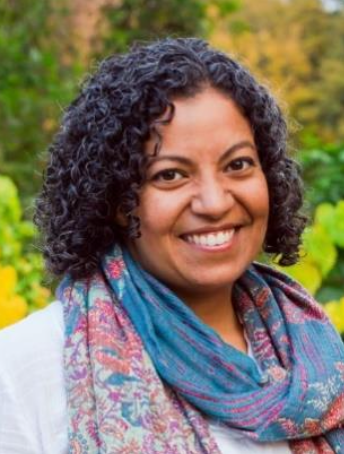
Leah Pincus, a 2022 electrical engineering graduate, was part of the first EMBARC cohort.
Professionals come speak to the class, spend individual time with the students at dinners and luncheons, and do mock interviews with students.
“It was sort of like getting to sit down with corporate celebrities and being seen as normal people, not just students,” Pincus said. “I feel like the network piece of it was so huge, because these are not connections we would make as students.”
Leriche even met his current boss at Intelsat, a satellite services provider, through the program.
The connections formed go beyond the program. Even after completing EMBARC, Coker and the rest of the team assist students as they prepare to enter the workforce and navigate their careers.
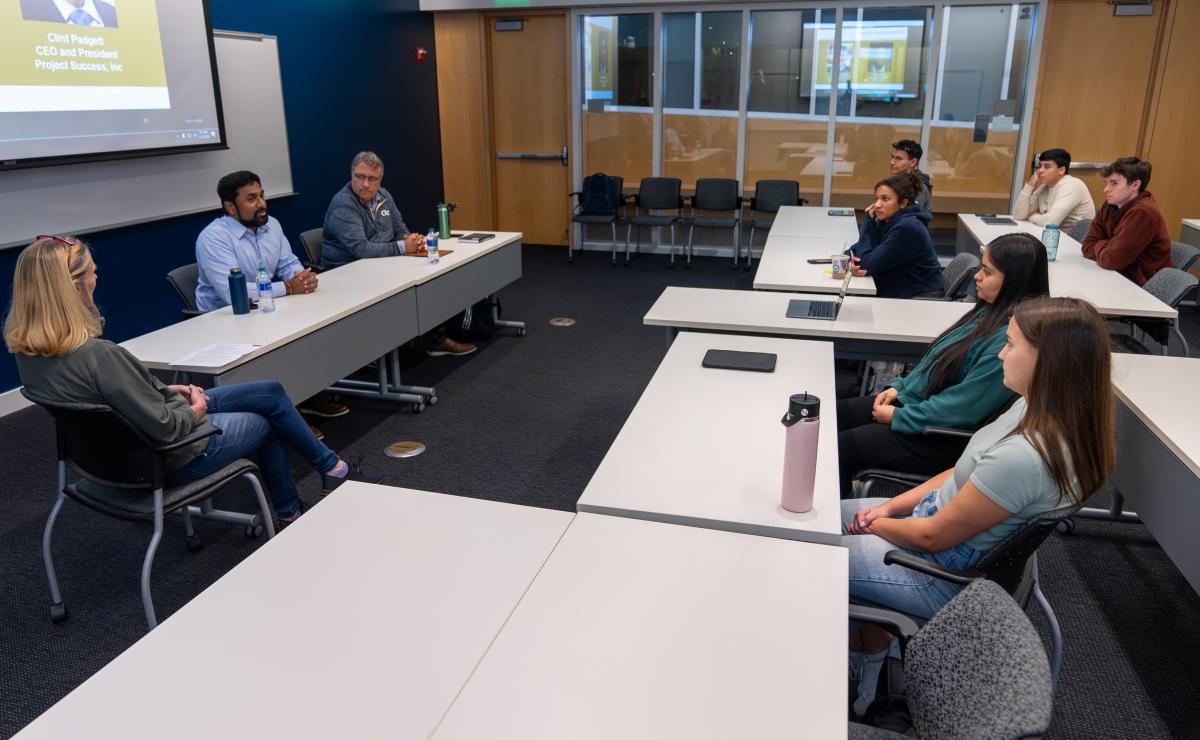
Students hear from ECE alumni Shan Pesaru and Clint Padgett at their monthly meeting. Students frequently network Georgia Tech alumni and Atlanta Business leaders, getting the chance to learn and build connections.
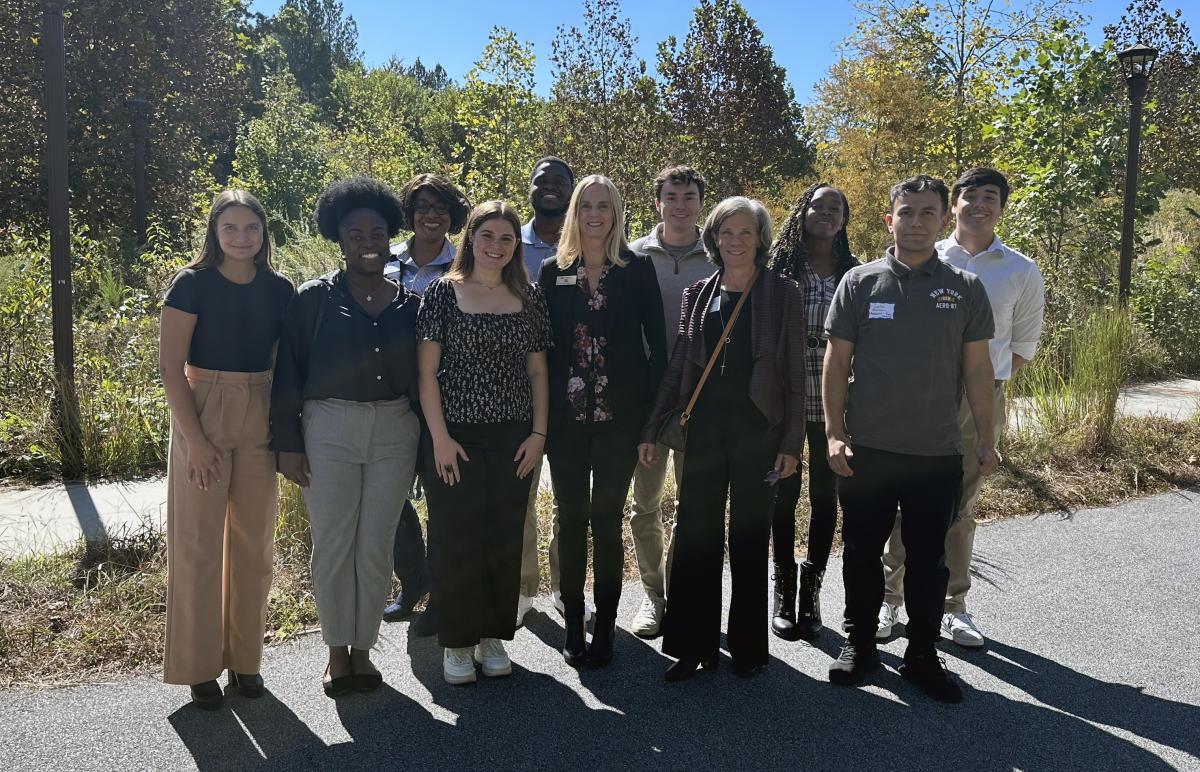
The 2024-2025 EMBARC cohort.
They critique resumes, provide interview preparation, and review job offers. They also provide personal finance education, teaching students about saving for retirement and budgeting so they can live comfortably once they land a job.
The program, now in its fourth cohort, has successfully guided 42 students. They’re landing jobs, making better lives for themselves, and aiming higher than ever before.
“It allowed me to dream bigger,” Pincus said. “When I went back to school, I thought I would get a job as an engineer. But now I have my sights set on that C-Suite, that VP position. Now I know that I have what it takes for that.”
For more information about the EMBARC program, contact ECE Academic Program Manager Raquel Plaskett.
(text and background only visible when logged in)
Related Content
A Season of Gratitude: Celebrating a Year of Achievements in Georgia Tech ECE
ECE students, faculty, staff, and friends reflect on the achievements of the year and embrace gratitude of the season.
Silent Retreat Program Helping Students to Quiet the Noise of Busy Semesters
Professor John Cressler has participated in silent retreats for over 25 years, touting the mental benefits of time away from the outside world. Now, thanks to generous contributions from Georgia Tech graduates, he’s leading students through the journey (and benefits) of silence.
